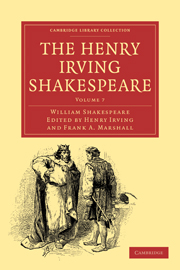THE TEMPEST
Published online by Cambridge University Press: 29 August 2010
Summary
INTRODUCTION
LITERARY HISTORY
The Tempest was printed for the first time in the Folio of 1623, and occupies the first place in that collection. The text is far from accurate.
The only authentic record of any previous performance is the notice discovered by Malone, in Vertue's MSS., of the play having been acted at court in February, 1613, on occasion of the marriage of the Princess Elizabeth to Frederick, Elector Palatine. We shall shortly find good reason to conclude that this was also the date of composition. That this date was at all events not earlier than 1603 is evident from the fact that the leading features of Gonzalo's commonwealth (act ii. sc. 1) are derived from Florio's translation of Montaigne, published in that year. This entirely overthrows Mr. Hunter's theory, advanced in a special essay, that the date of composition was 1596. Elze's notion that it was 1604 avoids this particular objection, but has no groundwork except this critic's fixed idea that the last ten or twelve years of Shakespeare's life were spent in idleness. If this is not admitted, the internal evidence of the versification, clearly establishing that the play belongs to the last group of Shakespeare's creations, proves also that it must have been written after 1608 at all events. The metrical test is quite decisive on this point, the proportion of double endings being, roughly speaking, 33 per cent, against 25 per cent in Antony and Cleopatra (1608), and 12 per cent in As You Like It (1599).
- Type
- Chapter
- Information
- The Henry Irving Shakespeare , pp. 177 - 254Publisher: Cambridge University PressPrint publication year: 2009First published in: 1890

